E-Pluribus | December 7, 2023
A congresswoman's strange take on free speech; preventing terror with...woke art? And one university's struggle to *keep* its discriminatory hiring practices.
A round-up of the latest and best musings on the rise of illiberalism in the public discourse:
Jonathan Turley: “Engaging in Personalities”: Rep. Summer Lee’s Curious View of Free Speech
‘Free speech for me but not for thee.’ While Rep. Summer Lee (D-PA) did not use those words, that was her message to swimmer Riley Gaines at a congressional hearing this week. On his blog, Jonathan Turley explains how misguided Lee’s thinking is.
Rep. Summer Lee (D., Pa.) has long been a voice for censorship, attacking those who seek to restore free speech on social media. Lee’s curious view of free speech was on display this week when she attacked witnesses, including Riley Gaines, as hateful and transphobic but then tried to censor Gaines when she responded to Lee’s attack as misogynistic.
[. . .]
In the hearing on transgender students competing in sports, Rep. Lee launched into attacks of the witnesses: “Madam Chair, I ask that while we sit through this hearing and the hateful misinformation I’m sure is coming our way, let us not forget the children at the core of this issue.”
Gaines, who achieved fame as a college athlete after racing against transgender swimmer Lia Thomas, responded to the attack. She testified: “Of course, there is a place for everyone, regardless of gender identity, regardless of sexual orientation, regardless of race or what sports you play. There’s a place for everyone to play sports in this country. But unsafe, unfair and discriminatory practices towards women must stop. Inclusion cannot be prioritized over safety and fairness, and ranking member Lee, if my testimony makes me transphobic then I believe your opening monologue makes you a misogynist.”
Lee then pounced and demanded that Gaines’ remarks be struck for “engaging in personalities” rather than the substance of the debate: “I move to have the gentlewoman’s words taken down.”
What followed was hurried consultation and presumably a few explanations for Lee on why witnesses are allowed to respond to such attacks by a member. Lee then withdrew her demand.
[. . .]
The fact that Lee’s immediate response was to censor a person who she had just attacked is telling. After labeling Gaines a hateful bigot, Lee did not believe that she should be allowed to denounce Lee’s own comments as an attack on women.
Read the whole thing.
James Varney: Now Defending the Homeland: Wokespeak Grants to Arts Groups
The Department of Homeland Security’s Targeted Violence and Terrorism Prevention program seems more interested in dispensing DEI-inspired grants than actually preventing violence and terrorism. Writing for Real Clear Investigations, James Varney looks at where these taxpayer funds are going.
The [Targeted Violence and Terrorism Prevention] program has its roots in the Obama administration under the concept of “countering violent extremism” and has drawn criticism ever since from both left and right – albeit for different reasons. During the Trump administration, the leftist Brennan Center for Justice faulted the “anti-Muslim and xenophobic rhetoric and policies” in such programs, which “also target refugees, asylum seekers, and Black Lives Matter activists.”
The Brennan Center said “the reality is that these programs, which are based on junk science, have proven to be ineffective, discriminatory and divisive.”
That was then. Now, having doubled the program’s budget, the Biden administration is using the money to advance parts of its agenda not directly related to terrorism. Increasingly the DHS grants, like much larger ones at other departments, are part of the administration’s “whole of government” effort to promote “diversity, equity and inclusion” and quash what it considers misinformation.
While proclaiming that that the grants are designed for “local communities across the country to develop targeted violence and terrorism prevention programming in their communities,” the Department of Homeland Security also stresses its focus on DEI.
“Ensuring equity is a key priority of the TVTP Grant Program and 41 percent of this year’s grant recipients are devoted to underserved populations, compared to 25 percent last year,” the DHS website says, noting grants have gone to historically black colleges and universities, seven “Minority Serving Institutions (MSI),” a Native American group and another serving the LGBTQIA+ community.
The program uses keywords to note favored characteristics of approved grants. Ones used often include “raising societal awareness,” “bystander training,” and what advocates call “media literacy.”
“Media literacy involves the critical evaluation of media messages, as well as their authors and audiences, and it includes the ability to differentiate between original, evidence-based reporting and commentary or propaganda,” said Seth Ashley, a communications professor at Boise State University, which has received nearly $400,000.
[. . .]
One of the recipients of DHS funding for media literacy is the University of Rhode Island, which received $700,000 in TVTP grants in 2022. The money has helped pay for “Courageous Rhode Island” initiatives that involve online seminars and work with K-12 schools.
In one of Courageous R.I.’s starter seminars, URI professors Renee Hobbs and Pam Steager discuss warning signs for media consumers. The flags include sources that “attract audience attention by finding and promoting unexplained phenomena or coincidence that seems at odds with official narratives.”
In another, the professors warn of “contrarian ‘experts’ [that] increase visibility and status by exploiting journalistic norms of balance and neutrality to present a controversy that counters widely-accepted beliefs.”
Read it all here.
Anita Kinney, Anthony Pericolo: No White Faculty Allowed
Hiring the most qualified instructors appears to have taken a back seat at the University of Washington. Instead, the school seems focused on recruiting faculty who fit certain demographic criteria. Even acknowledged discrimination in past practices has done little to change how the university conducts itself, as a close look at an internal hiring handbook by Anita Kinneya and Anthony Pericolo at City Journal makes clear.
A recent internal investigation into faculty hiring at the University of Washington reveals the exhaustive efforts that universities make to discriminate against white job applicants. After the university’s Department of Psychology identified a white candidate as best qualified for a tenure-track professor position in early 2023, the department’s Diversity Advisory Committee pressured the hiring committee to re-rank candidates in accordance with the methodology laid out in an internal handbook titled “Promising Practices for Increasing Equity in Faculty Searches” so that a black woman would receive the job instead. This handbook, obtained by the National Association of Scholars, spells out how to exclude candidates of undesirable races and ensure that candidates of preferred races get hired.
The handbook sheds light on past discriminatory hiring practices in the psychology department. In the 2020–21 academic year, the department hired only BIPOC (black, indigenous, people of color) candidates for five tenure-track positions. Delighted by its success in excluding all white candidates, the department’s Diversity Advisory Committee commissioned the “Promising Practices” handbook as a case study documenting its past manipulation of the hiring process. The handbook served as a how-to manual in the 2022–2023 academic year, ensuring that a BIPOC candidate would be hired for the department’s only tenure-track professorship that year.
[. . .]
If, somehow, a committee still managed to hire white people or the wrong minorities, the manual suggests developing an audit process to identify criteria where “white candidates, male candidates . . . receive higher scores,” so that those criteria can be removed. Particularly, rigorous scientific practices like “publicly posting data, hypotheses and materials to guard against accusations of selectively reporting results or falsifying data” tends to “produce biased results”—namely, the hiring of white men. This was easily solved by “subsequently dropp[ing]” scientific rigor from “evaluation criterion” of candidate searches.
The University of Washington has apologized to the top-ranked white finalist who was denied a job in its most recent faculty search because of race. It also reports that it has taken as-yet undisclosed remedial actions and is updating institutional policies to “address areas where efforts to address bias may lead to violations of laws or policy.” But a slap on the wrist by an internal department and an acknowledgment of wrongdoing are not enough to stop discrimination. The university’s investigation focuses on the end result of one hiring process and does not investigate the racial discrimination in other hiring searches using the handbook. Moreover, it focuses on just one department—but a department that felt emboldened to document such sophisticated racial discrimination and offer it as a practical framework for colleagues (in violation of guidance from university officials) is likely the tip of the iceberg.
Read it all.
Around Twitter (X)
Here’s University of Pennsylvania [ed. note: originally incorrectly said “Penn State University”] president Liz Magill clarifying her Congressional testimony about campus calls for genocide. (click for video)
The Foundation for Individual Rights and Expression is less than impressed with Magill’s response. FIRE’s tweet is long-form, so only a portion is below, but click for the whole thing.
Steven Pinker seconds FIRE’s motion:
And finally, Betteridge's law of headlines says, "Any headline that ends in a question mark can be answered by the word ‘no.’" Wesley Yang has run across an exception in the New York Times:




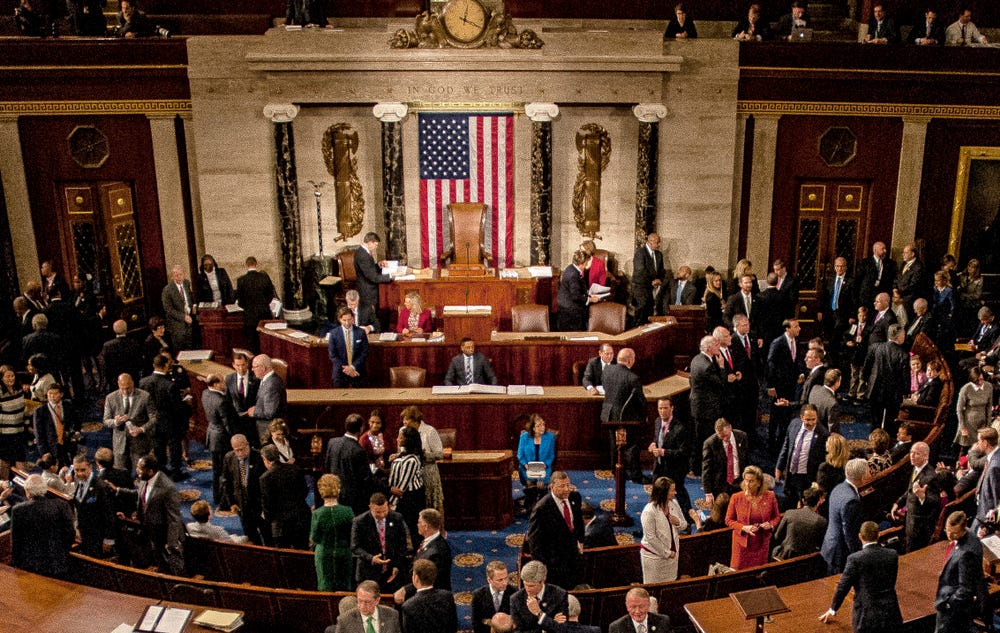
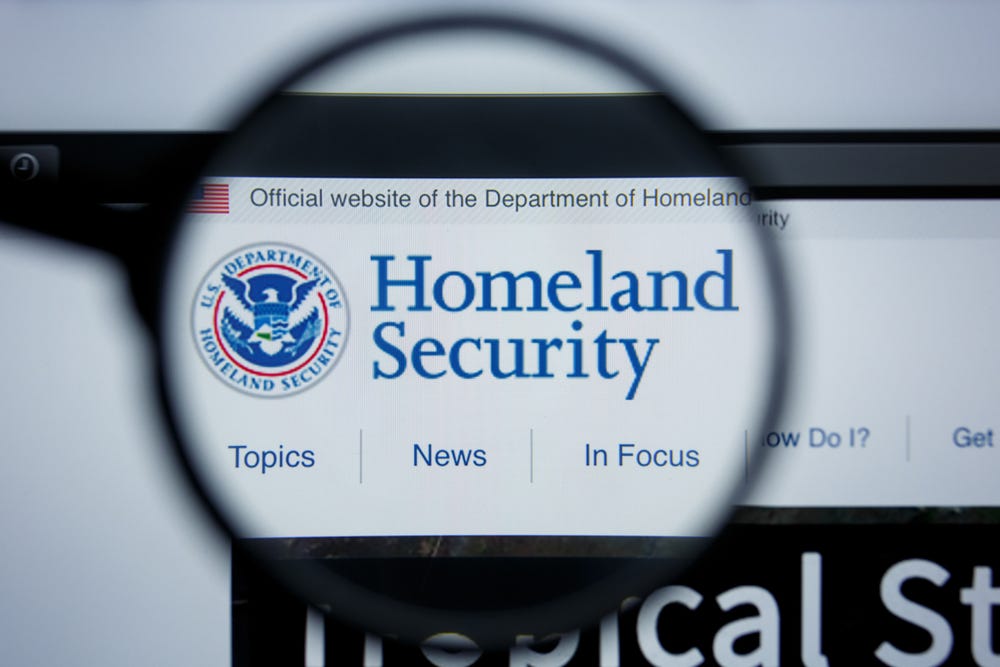

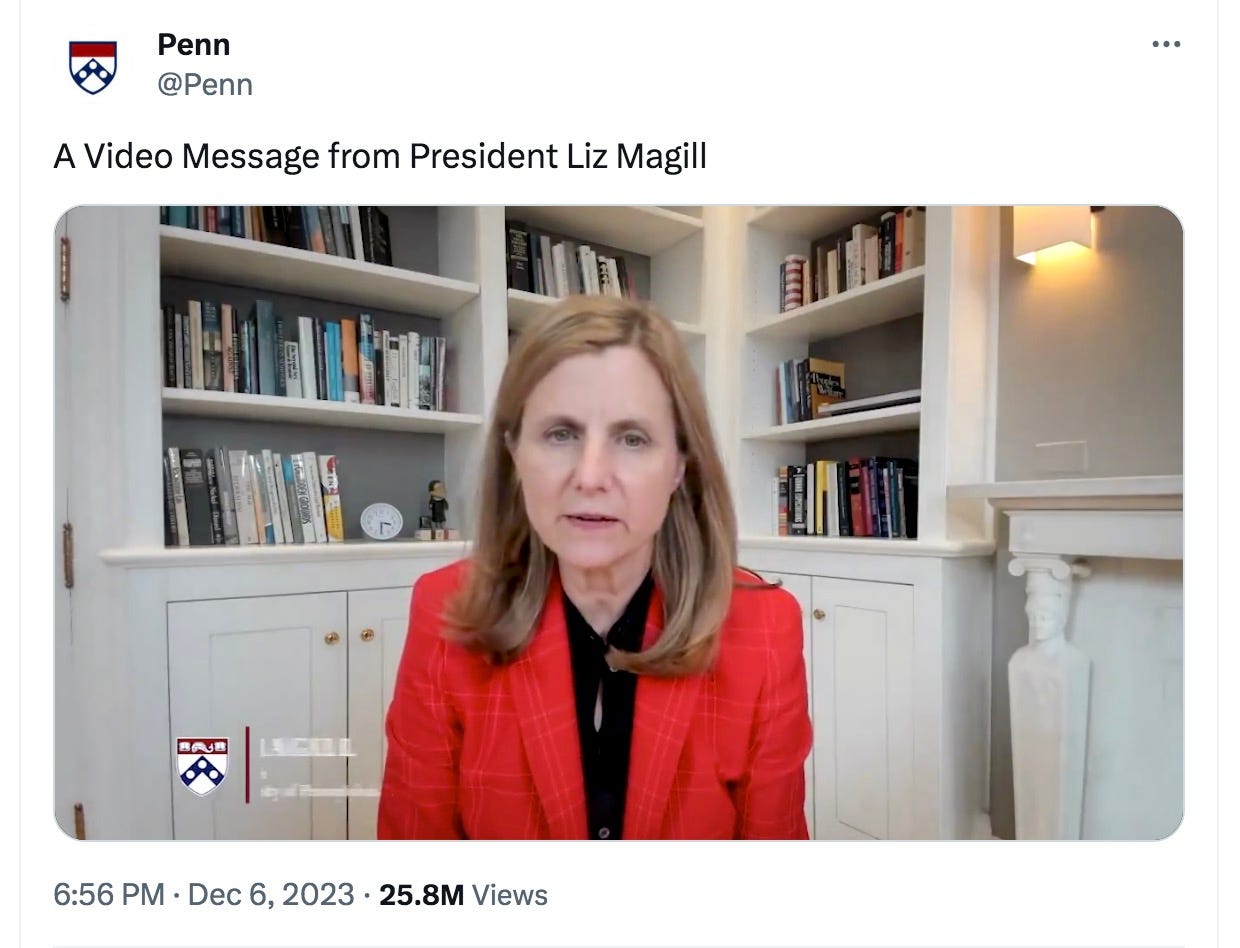
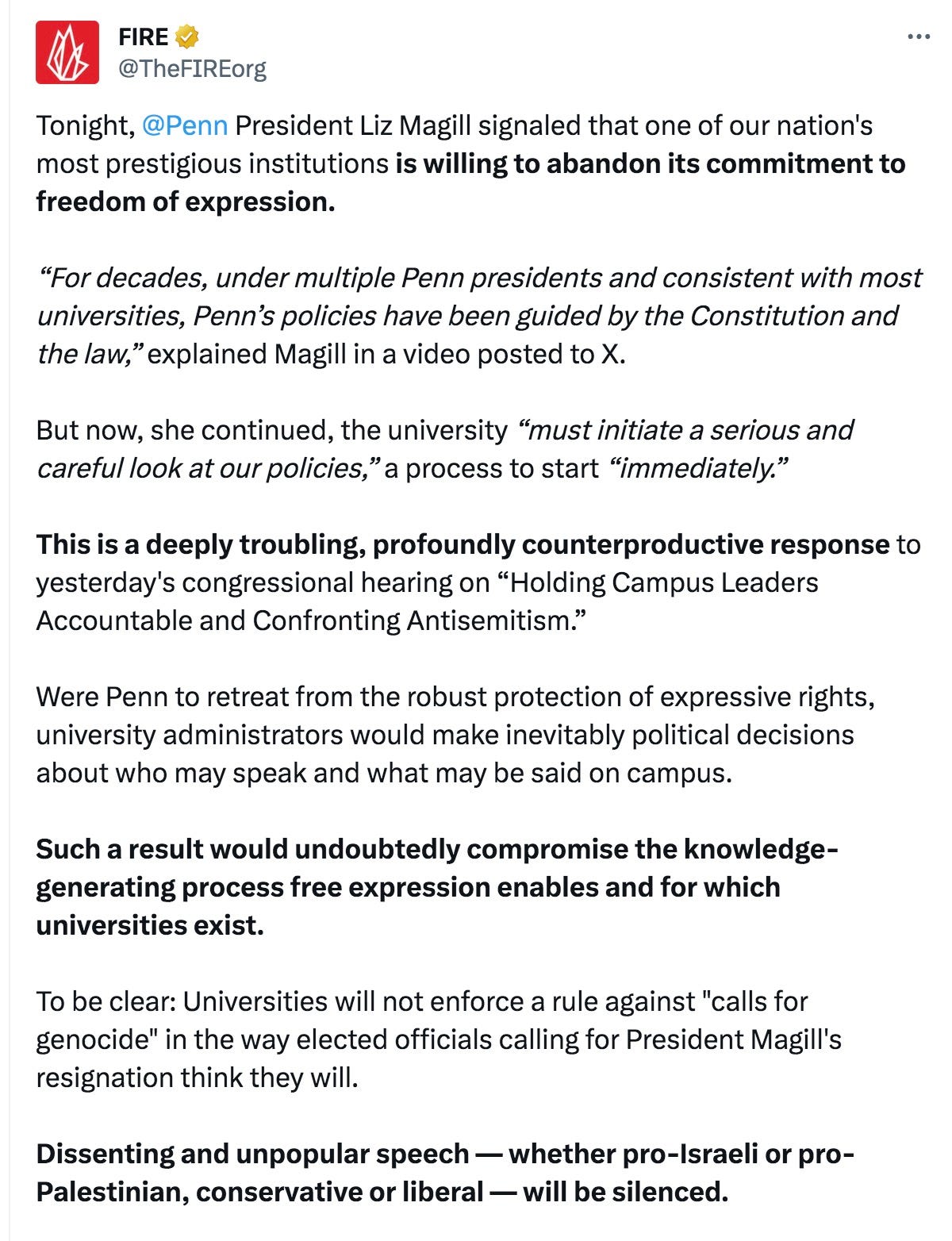
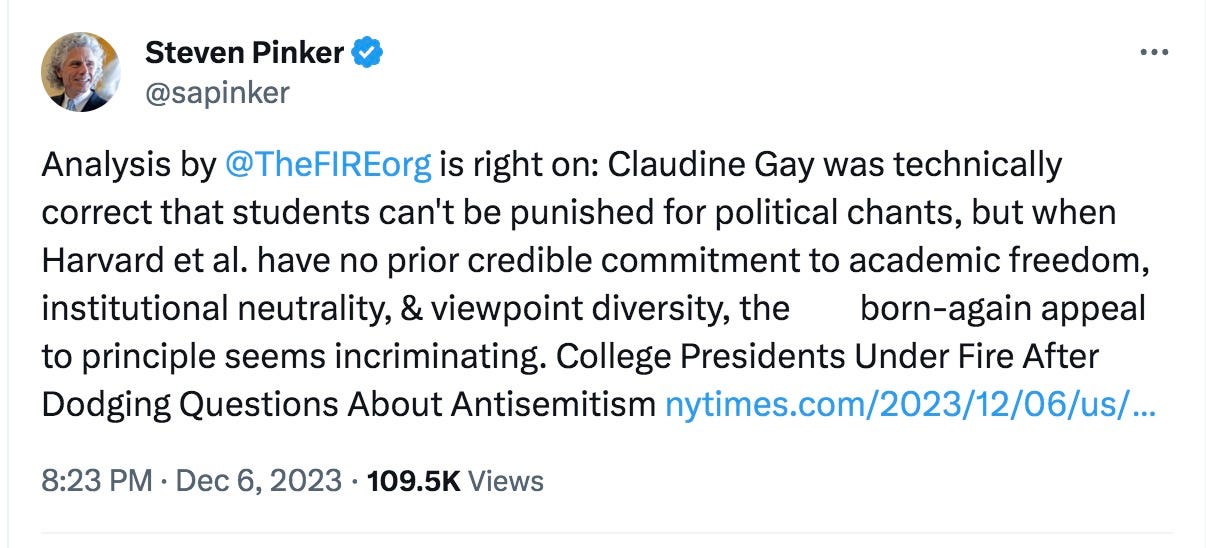
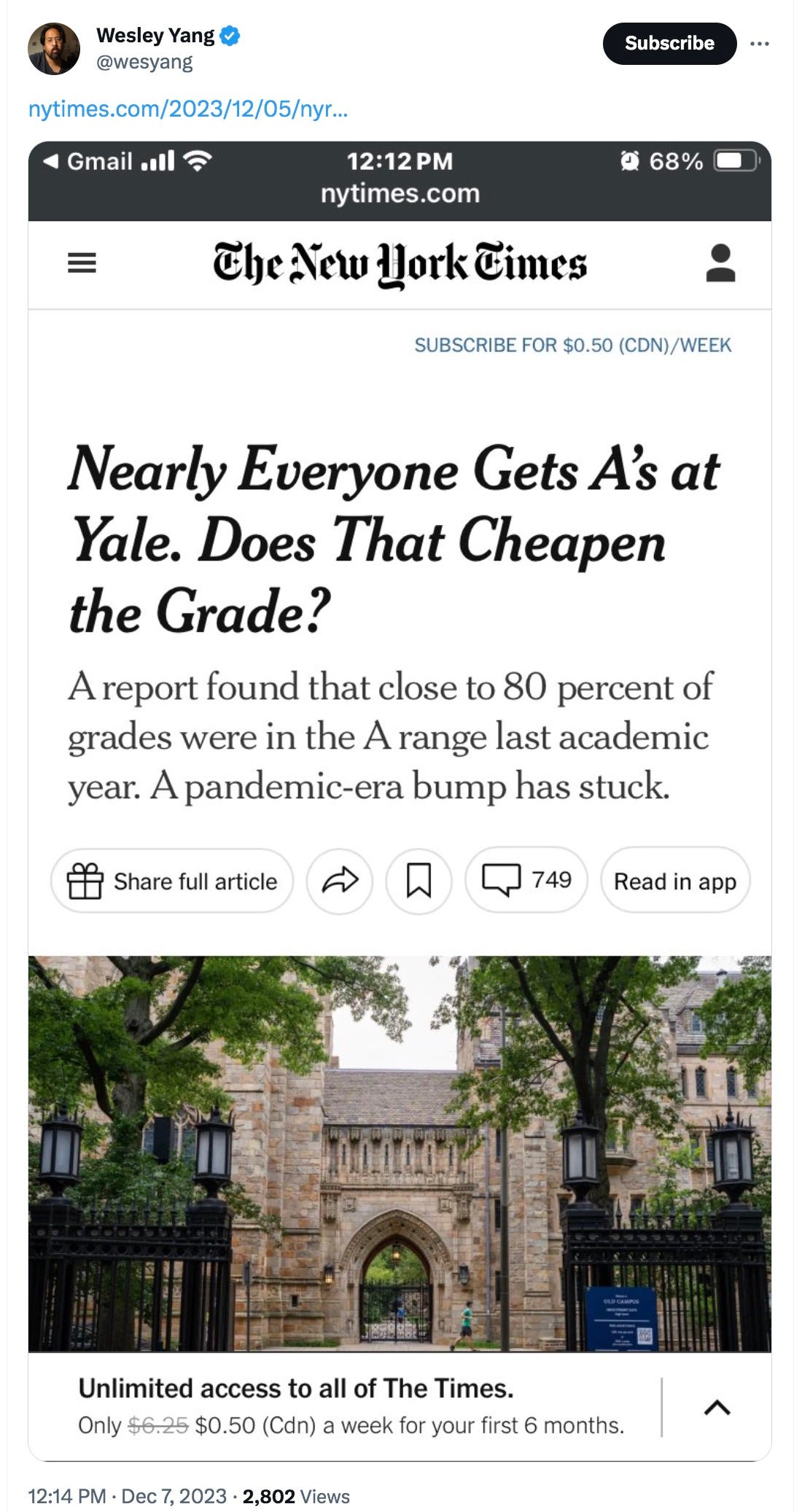
UPenn, not Penn State